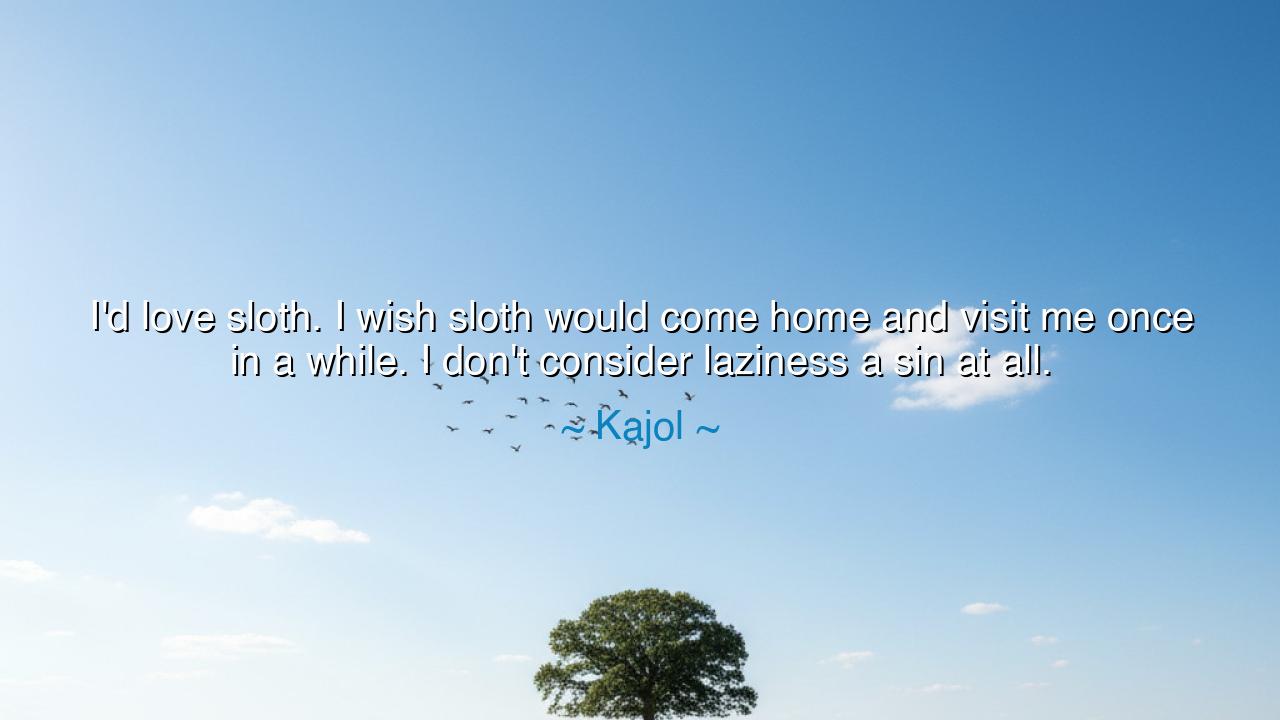
I'd love sloth. I wish sloth would come home and visit me once in
I'd love sloth. I wish sloth would come home and visit me once in a while. I don't consider laziness a sin at all.






She laughs like a bell and then speaks a small rebellion: “I’d love sloth. I wish sloth would come home and visit me once in a while. I don’t consider laziness a sin at all.” Hear the playful heresy under those words. In an age that burns incense to busyness, she dares to bless stillness. She does not praise apathy; she invokes the sacred idleness that lets a soul breathe—those unrushed hours when the heart loosens its armor and wisdom can find a chair.
The ancients would have understood this hymn to leisure. In Greece, scholē—from which we draw “school”—meant leisure, the time made available for thinking, wondering, and becoming. In Rome, otium was not mere idling; it was the noble counterpart to negotium (business), a season set aside for reading, friendship, and the tending of one’s inner republic. When she welcomes sloth, she is, in truth, calling for the older rhythm: work yoked to rest, speech braided with silence, action answered by contemplation.
Beware the confusion of tongues. There is a vice named sloth—the emptiness the monks called acedia, a gray fog that refuses love’s tasks. But there is also holy idleness—Sabbath, siesta, the long walk at dusk—that refuses the tyranny of perpetual motion. The former forgets what matters; the latter remembers it. When she says she does not count laziness a sin, hear a protest against the sermon of productivity that would measure worth in checkboxes. She is not crowning neglect; she is rescuing rest from shame.
History serves a parable in the language of discovery. August Kekulé, wrestling with the puzzle of benzene’s structure, dozed by the fire and dreamt of a snake swallowing its tail—idleness midwifing insight. Winston Churchill, commander and statesman, scheduled daily naps and credited them with double strength. In Japan, the space between notes is honored as ma; without that pause, music is mere noise. These are witnesses for the defense: sometimes the mind must wander so truth can find it; sometimes the field must lie fallow so the next harvest can be generous.
Nor is this only a cure for thinkers. Households and friendships also require the unhurried hour. The child who sprawls on the floor with nothing assigned grows a private garden of imagination. The lovers who spend an afternoon doing “nothing” often find they have done the essential: they have remembered each other without agenda. A life without sloth—without margins, drift, loafing—becomes a page overprinted until the letters blur. To welcome sloth “home,” as she says, is to set a chair for joy.
Let the lesson be written like a rule on your doorpost: Rest is not the enemy of virtue; it is the tutor of proportion. Work cleanses pride when it meets resistance; leisure cleanses fear when it meets quiet. The week needs a Sabbath the way lungs need an exhale. If you deny yourself laziness of the right kind, you will eventually meet the wrong kind—the collapse that follows unrelieved strain, the bitterness that mistakes exhaustion for meaning.
Rites for the road: (1) Keep a small otium each day—fifteen inviolate minutes with no device, no duty, only breath and noticing. (2) Set a weekly Sabbath of idleness—read slowly, nap without apology, walk with no destination. (3) Practice “fertile laziness”: lie down with a pencil nearby; when thoughts drift toward a knotty problem, jot the visiting answer and drift again. (4) Defend unstructured time for children and for love; refuse to schedule every ounce of wonder. (5) Name the difference aloud: “This is replenishing rest, not neglect,” so your conscience learns the new grammar.
Do these, and sloth—the gracious kind—will indeed “visit you once in a while,” bearing gifts: clearer sight, softer speech, steadier courage. The world will still ask for your hands, but you will offer them from a heart unhurried, and your work will taste less of anxiety and more of wisdom.






AAdministratorAdministrator
Welcome, honored guests. Please leave a comment, we will respond soon